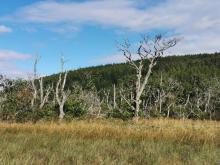Investigation into the causes of Alder (Alnus glutinosa) mortality in Scotland

The project investigated whether alders in Scotland have experienced a recent decline in health and identified factors affecting their condition. It also aimed to improve monitoring methods and address key issues for future management and regeneration of riparian alders. Alders play a crucial ecological role, particularly in upland areas where they are often the only tree species.
Findings revealed no evidence of a widespread recent decline or a single damaging agent, though signs of historic dieback were noted. Causes of decline included waterlogging, invasive species competition, infections by pathogens like Phytophthora alni and Valsa oxystoma, and occasional bacterial infections. Even-aged alder populations with limited regeneration were common, and grazing pressure often impeded seedling survival.
Key recommendations emphasised improved monitoring, biosecurity measures, and exploring natural regeneration or direct seeding instead of planting to reduce disease risks. The importance of disease-free planting stock and clean equipment was highlighted. Conservation efforts should account for local adaptations, and targeted regeneration at sites offering high environmental benefits was suggested. Grazing protection strategies are also critical for successful alder establishment and spread.
This study underscores the need for proactive management and tailored approaches to ensure the long-term health and ecological role of Scotland’s alders.
